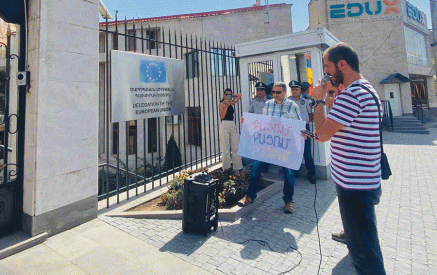by EU NEIGHBOURS east
Technologies give power to those who are aware of them and can take maximum advantage. Either you control technologies or they control you. Policies are created in order to control technologies. So if you are part of the digital policy, you can control technologies and how they are integrated into your life.
When would you have a 5G connection on your phone instead of 4G? When you download an application, is it asking you to provide access to your photos or contacts? If you forget your passport at home, would you be able to show your digital passport to prove your identity? Can you register your business online? Do you know what to do if your account or post was blocked or deleted from social media?
If you answer these questions easily, then you are aware of the digital policy for your country and also those of the EU, as the latter is the world-leading power in establishing rules for the digital world. If not, for sure these questions have arisen in your mind, so this article clearly explains why you should be ‘IN’, and where to begin in order to understand the digital policy.
Read also
What is the digital policy?
The digital policy serves as the framework for the incorporation of technologies in all areas of people’s lives, making it easier and more comfortable and, most importantly, safeguarding the digital rights of everyone. The digital policy is an ecosystem of policies that establish rules for the activity in the information space. These rules include the production and application of technologies in terms of:
- provision of digital services
- ICT Infrastructure
- cyber security standards
- protection of digital rights of citizens
- digital skills
Why should you be ‘IN’?
First, it is the basis of your security. Just look at how Ukrainians are fighting on the digital frontline and you will understand.
With Russia’s brutal and unprovoked full-scale invasion of Ukraine, we see the fight not only on the military frontline but also in the digital sphere. Some may say the cyber front, but I prefer the digital front, as the war includes but is not limited to cyber-attacks. Proactive digital diplomacy, the presence of the vital IT Army and information forces, and the promotion of state identity narratives are all elements of the information war in which Ukrainians have managed to mobilise all their efforts to counter Russian information aggression. At the same time, the country continues to digitalise public services and implement measures aimed to provide support to the IT sector of Ukraine.
People who are ‘IN’ digital policy join the government’s initiatives aimed at the protection of the digital frontline. Just as the state faces constant cyber attacks – 1,123 attacks in 6 months since 24 February – so every citizen is also directly or indirectly subject to them through online fraud and phishing or the leak of personal data collected by institutions or services. Nearly half the population uses the state application Diia. With the war, Diia has become the main channel of communication between the government and people when access to physical administrative services was limited. If you wonder whether it is well-protected, the quick answer is yes, as Diia does not collect personal data and has secure algorithms for work.
Ukrainians can do everything through the Diia application, from sending data about enemy troop locations, to helping older people to register their digital pension cards. You don’t need to possess an IT background to be ‘IN’, you just need to understand what initiatives are in place and how you can use them to provide your security and be of help to your country. You need to be curious about what is on your phone beyond social networks, browsers, and messenger. Your smartphone is a tool and a weapon. Meanwhile, more than 400,000 Ukrainians have joined the IT army and the information forces that counter pro-Russian disinformation channels, sending constant complaints about content regarding the war to social media companies.
The second argument for why it is better to be ‘IN’ is to be an innovator and trendsetter in every field you are involved in.
Digital policy reaches all areas. So whatever area you work in, sooner or later you will have to adapt to the regulations and standards set by the EU. In this way, the EU sets out the green digital policy that enhances the role of technologies in the green transition. One simple example: switching from 4G to 5G networks can reduce energy consumption by up to 90%.
The main strategic document of the EU in the area of digital policy is the Digital Compass for the EU’s digital decade presented in 2021. It sets the priorities of work in four dimensions – skills, secure and stable infrastructure, digital transformation of business, and digitalisation of public services. But for the concrete aspects, the EU has its own regulations, for example in 5G, AI, semiconductors, cyber security, content, etc. These regulations affect both businesses and citizens, as well as the citizens in countries, like Ukraine, that are integrating with the EU and adopting its standards.
Recently, the EU launched the Cyber Resilience Act. If you are in any form of business, this regulation will significantly affect the cyber security guidelines you are following in your company, as GDPR once did with data protection. The Act sets the requirements for “products with digital elements” to be put on the EU internal market and complements earlier acts – the AI Act, the Cybersecurity Act, and the Network Information Security 2 (NIS2) Directive. Cyber security is an aspect that is emphasised in the EU’s Strategic Compass, the leading EU document of the Common Foreign and Security Policy issued in 2022.
The next policy that is debated in any area is the application of AI. In this regard, the EU has its own regulation – the AI Act. It is focused on the high-risks systems of AI, not the ones we use in everyday life, for example unlocking our phone with face ID. High-risk AI can determine access to education or the professional course of someone’s life, be used in CV-sorting software for recruitment procedures, be incorporated in judicial settings used for the evaluation of the reliability of evidence, be a tool for verification of the authenticity of travel documents in migration, asylum, and border control management, etc. For such AI and others, the EU has set strict requirements. Are you worried that the public recognition of faces on the streets would never be possible in Europe, as it is in China? The EU in all its policies and regulations fosters basic values and principles, including respect for the digital rights of citizens, so such a case would be impossible.
If we speak about 5G, the EU is trying to regulate this process, but alignment with EU rules takes time for member states, so they do it at different speeds. As it is critical infrastructure – meaning that hacking the 5G network would have implications for the security of users and the network itself – the EU has a 5G cyber security toolbox that requires operators to stick to certain security rules. Here arises the question: what companies are building the networks in your county, those of the EU – Ericsson, Nokia – or the Chinese Huawei? Speaking from personal experience in my dialogue with EU policymakers, the very first question I was asked after my speech on Ukraine’s digital advancement was – who is building/will build 5G networks in Ukraine? By the way, here is the website of the EU where it is possible to follow all the developments in this regard at the European level – https://5gobservatory.eu.
Last but not least, let me introduce you briefly to the issues of content regulation. The EU is carefully looking at the operation of the Big Tech companies on its market and refers these practices to the area of competition law. Recently, issues on content moderation and market competition arose at the EU level. This resulted in huge work being done and embedded in the EU Digital Market Act and Digital Service Act. If you use the services of GAFAM (Big tech companies – Google, Amazon, META, Apple, Microsoft), you should have heard about these regulations because they have set a precedent in the regulation of digital platforms. They will affect the use of social media, both on personal and professional levels. Very often social media can delete a post without providing a clear reason. Sometimes it can block the user. Do you know which data are collected so that you receive your personalised targeted advertisement? All these problems and many others will be resolved with these acts. They include strong new obligations to tackle all forms of illegal content: counterfeit or dangerous products, incitement to violence, and hate speech. For example, a new framework for online advertising to limit the use of data and protect the most vulnerable users, especially children will be introduced.
We can also talk about many other aspects of digital policy. What is the link between the rise of prices for the car that you wanted to buy and semiconductors? Or what is the role of small chips in the global tensions over Taiwan? Whether you just want to buy a car or you are a diplomat or expert in EU external policy, you need to have basic knowledge of EU digital policy. And what about cryptocurrency and digital finances if you want to follow the trends, including NFT?
That is why you should be curious about digital policy. The majority of people think that digital is a focused area for experts. It is not like that, because we all live in the digital world. Do you know the rules of the game in this world? In the physical world, you know that you can’t cross the road at the red light – it is a matter of basic security. But are you aware of such simple rules in the digital world – so that you can not only be a rule-taker but a rule-maker in terms of personal use of the technologies and in terms of your country’s policy in this regard?






















































